Camping Tanzanian Style
(Marie-mail #52)
ARUSHA
SEPTEMBER 21
I put my Thermarest, mosquito net, Wet Ones, and Skippy into storage. I wouldn't be needing them on my Guerba "comfort camping" safari.
After a quick run into town for more cash on my Visa card, I stopped by "Mambo Jazz Cafe" for some pasta.
Lupo, the manager, introduced himself. He was Italian by ancestry by had been born in Zambia. He invited me to drop by later for a drink, and to bring along my group.
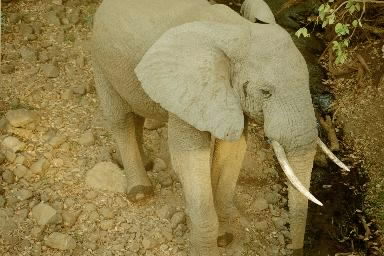 a Tanzanian elephant
a Tanzanian elephant
"Oh, right," I said. "It's Friday night." As a freelancer, my grasp on the delineation between weekend and weekday had already been tenuous; now my only awareness of the day of the week came from banks and post offices being shut on Sunday.
My group had left Nairobi at noon and was taking a shuttle to Arusha. My instructions from Guerba were to wait in the Impala Hotel lobby at around four.
The group showed up, leaderless, at seven. They all made a beeline for the hotel restaurant, leaving me stammering, "there's a good restaurant up the street."
A Tanzanian man approached me in reception.
"Excuse me," he asked. "Are you one of the seven that came from Nairobi?"

"No," I said and as he started to turn away added, "but I'm with them."
Now thoroughly confused, he stopped. I tried to explain that I didn't want to go up to Nairobi just to turn around and come back to Arusha, botched the explanation, and finally just said "yes, I'm one of the seven."
"Good. I need to talk to you."
He followed my upstairs and introduced himself as Wilfred. He wasn't our leader. Erasto, who the other six had been told to give their local payment to, was ill with malaria.

Wilfred was soft-spoken, had a thick Swahili accent, and the Impala restaurant was hosting a large wedding reception. We could barely hear him above the din, but he gave us a rundown of our itinerary anyway, and told us to bring out $310 local payment to reception in the morning. He left us with instructions to spend no more than 7000 shillings each on dinner.
The hotel restaurant food was pretty bad, and the service incredibly slow. To complicate matters, the restaurant staff had no idea that Guerba was picking up the tab and we didn't know how we were supposed to pay for our food. Finally, we all just put it on someone's room. We'd straighten it out in the morning.
It was after ten when we finally left the Impala restaurant. Everyone else was jetlagged and it was too dark and too late for me to wandering around Arusha alone. Lupo and the Mambo Jazz Café would have to party without me.
The wedding reception went late into the night, reminding me of my first noisy night at the dilapidated Arusha Centre Inn. Except the Impala charged about sixty more dollars a night than the Arusha Centre Inn.
ARUSHA TO KARATU
SEPTEMBER 22
Erasto, our malaria-prone leader, had miraculously recovered and shown up at breakfast. He billed us each for our dinner drinks the night before, leading me to be complain.
"We were each allocated 7000 shillings for dinner," I explained, "and I only used 4200 for a salad. Why do I have to pay for my Coke? The company is doing pretty well off me. They already saved my shuttle bus fare from Nairobi to Arusha."
He looked at me while he chewed this over, then laughed and invited me to try to convince the hotel to put the drink on the bill with the food.
"Never mind," I said. It had been difficult enough to get the bill in the first place.
We packed into two 4x4s, one a Toyota Land Cruiser and the other a Land Rover. Our bags went on a separate truck. We drove fifteen minutes west of town to Mesarani Snake Park.
"Don't go in here if you're afraid of snakes," warned Wilfred.
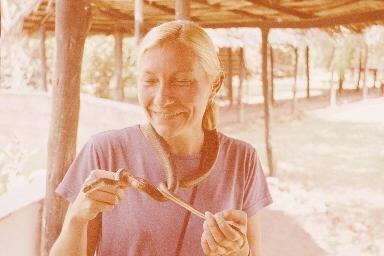 Marie at the snake park
Marie at the snake park
He was right. The snakes were all behind glass, but the enthusiastic snake park guide had a way of gleefully terrifying tourists.
"This is the Egyptian python. Watch, I'll make it rear up."
 python
python
He took a stick, opened the cage and poked around. We all froze in fear while he teased the snake and laughed. After that, we were lectured on black mambas, puff adders, spitting cobras, all manner of vipers and pythons, and man-eating, chicken-regurgitating, rabbit-swallowing snakes. We saw photos of people who had been cut out of snake bellies. The guide brought over an obligatory tree snake and wrapped it around my shoulders and then put three more on his own head.
Annette from the UK and I wondered where our fear of snakes came from. Was it socialized, through too much Indiana Jones, or was it instinct because snakes slither without legs? I believe the latter. It's unnerving to watch snakes move.
We finally left the cheerful guide behind and drove to a lunch stop at a campsite in Mto Wa Mbo. The itinerary described it as a crafts village, but all we saw was a campsite inside a fence. We were each given a lunch box full of margarine on bread, cold fried chicken, and Cadbury chocolate bars.
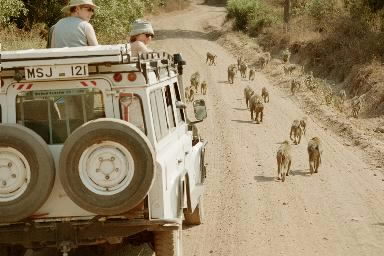 the only wildlife in Lake Manyara was in the parking lot
the only wildlife in Lake Manyara was in the parking lot
Our next stop was Lake Manyara National Park, home of tree-climbing lions — or, as Wilfred said, "grass-sleeping lions if we're lucky."
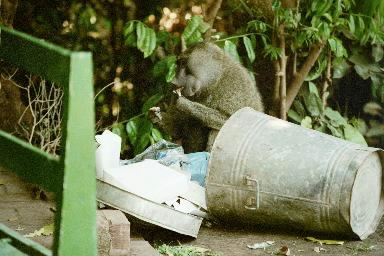
We weren't at all lucky. We passed another Land Rover on the way into the park. Wilfred stopped and had a chat with the driver. This happens frequently on safaris, as drivers tend to share information on sightings.
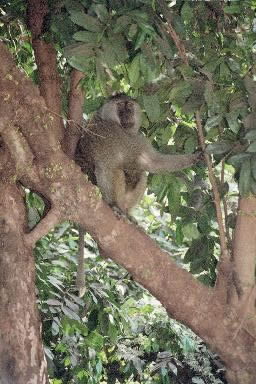
Although us tourists did not speak Swahili, it was obvious from their hand motions and from the slow shaking of the other driver's head that they were discussing the lack of wildlife in the park today.
"Did you see anything?" I imagined Wilfred was asking.
"Not a damn thing," responded the other driver, probably. "You're a fool to even try.
We drove on anyway. Five of the seven of us passengers were fresh off the plane, and got excited at baboons and the occasional giraffe. It was infectious, and I found myself enthusiastic over the tiniest sliver of elephant butt.

Finally, after spotting a few zebra, lots of baboon, and a few elephant, we reached the shores of Lake Manyara, where we were allowed to get out of the vehicles to walk around.
As we scampered about, we noticed a Land Rover just up the road. A elephant approached. The Rover stopped and flashes went off.. Then, the elephant stopped right in front of the car, studied it, and circled it apprehensively. The passengers all ducked inside, as their heads had been poking out of the top. The elephant blocked the road, staring hard at the Rover. The occupants must have been terrified, as a Rover is no match for an enormous African elephant.
Then, satisfied with scaring the daylights out of some tourists, the elephant lumbered on.
 Lake Manyara
Lake Manyara
We left Lake Manyara, having seen no lions — tree-climbing or otherwise — and moved on to "Kudu Camp" at Karatu. We left the paved road and drove down the bumpy, dusty, potholed roads, lined with young Maasai boys in painted faces, hoping to make a buck by posing for a photo.
Tanzania was, I'd discovered, fraying around its tourist-infrastructure edges. I'd been lulled into a sense of wonder by the ease and modernity of southern Africa, and was surprised to find that East Africa's tourist facilities were less-developed. Tanzania and Kenya were famous, well-regarded tourists destinations, unlike Botswana or Namibia. But the latter were switched-on to tourism, and the former were more of the haphazard, disorganized Africa I had expected to being with. Hotels were shabby and deteriorating, toilets were disgusting, and roads barely qualified as such. I'd expected the years of safari-tourism to have created a cushy experience through competition. Instead, due to the impact of too many tourists, it had created a compromise — inflated tourist prices and lousy conditions outside of luxury lodges.
Still, I was amazed when we pulled into Kudu Camp. The Guerba camp staff of five had raced ahead and set up enormous tents, canvas camp beds, and a dining table and chairs. They'd even cooked a dinner of beef stew over rice, and Chef William had written up a menu card.
The food was great, and the camp nice. The Guerba overland truck at the site next door never had it so good. Still, I had doubts.
The Guerba overland truck next to us had no dining table, no camp beds, and they had to set up their own tents. They were on practically the same itinerary, using identical campsites with the same facilities, but had paid a lot less money. The camp bed was uncomfortable and I used it only as a luggage rack, dragging the mattress pad onto the group. Was I paying a third more just to not have to set up my own tent?
Eli from Norway had just been on a Guerba comfort-camping safari in Kenya.
"This is the best campsite we've stayed at," she said. I worried. This was one of the worst sites I'd stayed at so far.
I went back to my tent to write, and discovered my fresh, new AA batteries had completely run down. I'd have to buy more.
KARATU TO SERENGETI
SEPTEMBER 23
The camp staff stuffed us full of fried eggs for breakfast and the usual instant coffee. But I'd learned my lesson and brought my own this time — I had filter coffee and filters, and instant oatmeal to eat in place of fried eggs. I had never eaten so many fried eggs as I had in Africa, and never wanted another. The thought of a fried egg made me queasy.
Leaving the staff to dismantle our tents and put our bags in the truck, we drove west towards Ngorongoro Crater. Children dressed in red tribal Maasai blankets waved as we passed by. Invariably, their waves turned to ghost-scribbling motions. These children were used to getting pens thrown to them by tourists.
We arrived at Ngorongoro Crater park reception office, and stopped to do paperwork and use the toilets. I tried to buy my batteries there, but they were only sold in packets of six for 12,000 shillings. Spending $13 on batteries seemed like overkill to me, so I opted out.
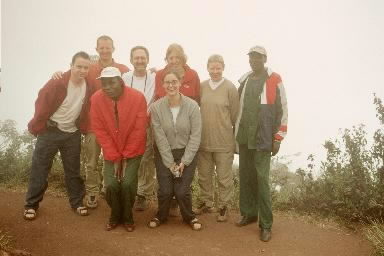 group on crater rim
group on crater rim
We drove on to a crater rim viewpoint, where we saw a lot of thick fog. Then, it was on to a wildlife lodge where we were able to admire the fog from a viewing platform.
I went into the souvenir shop.
"How much for your batteries?" I asked, pointing at a pack of two AA batteries.
"$7."
I winced and then laughed.
"I'm sorry," I said. "I cannot possibly spend seven dollars on two batteries. I'd rather sit in the dark."
"Okay, you bargain. How about five dollars?"
I laughed again and continued my exit. Tanzania was not winning me over. I had heard people refer to places "ruined" by tourism and thought perhaps I had finally stumbled onto one of those places. Years of visitors paying inflated prices had created an economy where it was expected.
There was a television in the lobby, and I was pleased to note that the news was about a hula-hoop manufacturer. News about hula-hoops was good news, as it meant that the US response to September 11 had not been to launch a full-scale war.
Before we left the lodge, Erasto asked us to make a choice.
"Sometimes," he said, "it's cold at Ngorongoro Crater, and some people like to stay in the lodge instead of at the campsite. Guerba pays $20 towards your lodge, but you have to cover the other $20-40, depending on your negotiating skills. We'll be back here in three days. So, who wants to stay in the lodge?
"That's impossible to say," I pointed out. "How can we know now how cold it will be in three days?"
Erasto thought for a minute and laughed. Charlie from the UK interjected with "you take your chances." Erasto agreed that we could call later to see if the lodge had rooms.
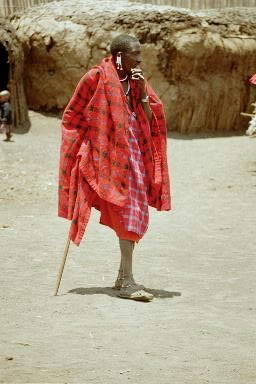
Our next stop was a Maasai village. The Maasai are the famous nomadic cattle-herding tribe of Kenya and Tanzania, well-known for their adherence to traditional lifestyles within the context of modern Africa. They still dance and guard against lions, but now some of them do it for tourism.
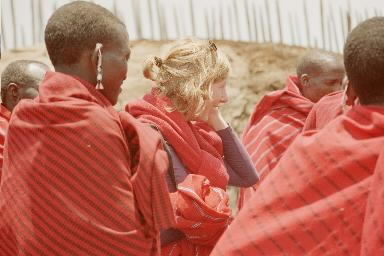
"Take as many photos as you like," said Erasto. "They're free."
Or sort of free. We were entering the nebulous world of tradition meets commerce.
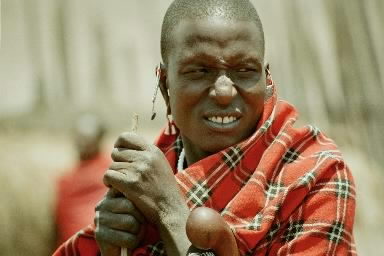
In '91, I went down the Amazon on a converted steamer. We stopped at a tribal village, where the tribe obligingly changed out of shorts and t-shirts, put on grass skirts and beads, and did a dance. Members of the audience were (as usual) pulled up to participate, and then bought trinkets before the tribe members changed back into their t-shirts.
In 2000, Intrepid took me into tribal Laotian villages. No one performed, but they welcomed us and let us take photos. In exchange, our leader brought them sacks of salt and flour. No one tried to sell us anything.
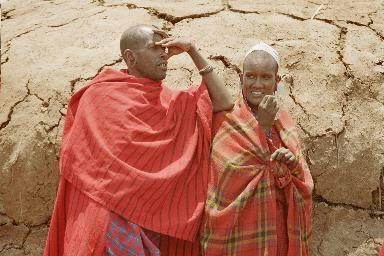
The Intrepid approach guaranteed a more "authentic" experience, but it was a slippery slope. How long before the village equated visitors with sacks of flour, and then realized they could get money instead? Starfleet's prime directive of no interference in developing cultures is impossible to maintain. You can't show people a culture without expecting it to influence them.
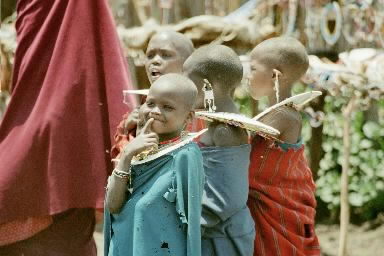
Our Maasai village was, at least, the real thing. It was a collection of small, circular mud huts — over a dozen — encircled by a round, reed fence. We'd seen plenty of Maasai nearby, all dressed in traditional bright red and black checked blankets, so we knew the Maasai still dressed the part and were not changing clothes for our benefit.
One villager invited us in. He wore giant metal earrings, which dangled from quarter-sized holes in his lobes. He followed us into the enclosure — a "Road Warrior-esque" Maasai world in the middle of the plain — and the girls of the village chanted while the boys jumped their Maasai dance. All were technically men and women, but seemed very young in spite of already having spouses and children.
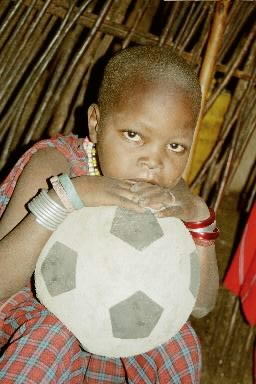
"The Maasai," explained our host, "can have several wives for one man. But each wife gets her own house."
The host took three of us inside his tiny hut. It was cool inside, but way too small for a family of four — which is what lived there.
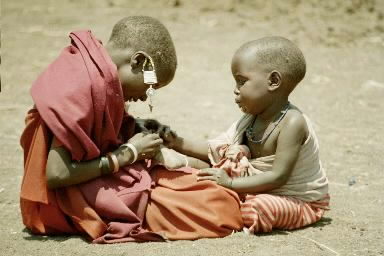
Afterwards, the Maasai tried to sell us trinkets, while the children asked for pens and coins. And several Maasai inquired about America.
"What will America do?" They asked excitedly. "Four airplanes, right?"
I felt a little guilty not buying anything, but Carl and Charlie bought anti-lion sticks, while Lucy traded an old watch for a blanket. The Maasai are huge watch fans, and probably all keep several as jewelry.
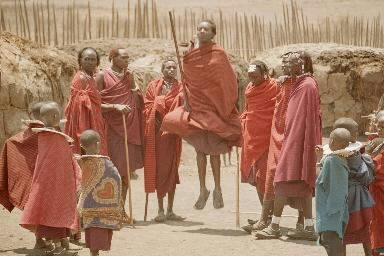
The Maasai had to be commended for their entrepreneurial spirit, but I wasn't too sure how I felt about attending their performance art. I took refuge in the Land Cruiser and waited for the others.
We left the village/theater behind us and moved on to Olduvai Gorge.
Mary Leakey had made a groundbreaking discovery of a skeleton named Lucy at Olduvai Gorge. I vaguely remembered learning about it in elementary school.
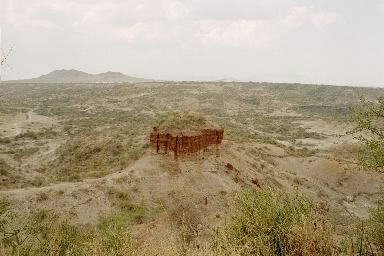 Olduvai Gorge
Olduvai Gorge
As usual, the Clintons had beaten me there. Photos of Hillary and Chelsea adorned the walls. The Clintons had a bit of that Princess Di effect on the third world, but people at home were relatively unaware of this. I am certain is due simply to acknowledgement. Princess Di and the Clintons are popular in these places because they took an interest, visited and gave validation through simple acknowledgement.
A group of Tanzanian schoolkids were at Olduvai Gorge on a field trip. One of them ran by me and the Hillary Clinton photo, and I noted with satisfaction that she wore a "Batman" baseball cap with her school uniform.
She boarded the schoolbus with graphitti scrawled into the dust on the back.
"Look, he's become some kind of Robin Hood," I said, pointing to the graphitti.
The rear window read "OSAMA OSAMA," and the bumper said "I (HEART) OSAMA BIN LADEN."
Us tourists watched silently as the bus pulled away. Too late, we remembered our cameras.
SERENGETI
SEPTEMBER 24
One perk of Guerba trips, on both overland trucks and on comfort camping safaris, is individual washing bowls. I was glad to had a bowl of hot water, as Serengeti campsites were equipped with pit toilets and one giant tank of water.
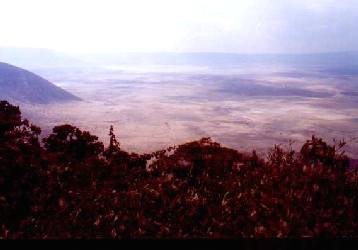 Rift Valley
Rift Valley
Lions like the tank of water. Wilfred and Erasto had dozens of stories of chance encounters with bemused lionesses. They had wound us up with stories right after last night's dinner, to where we were all a little disappointed that Carl or Charlie had not had to face off against a lion with one of their newly acquired Maasai lion sticks.
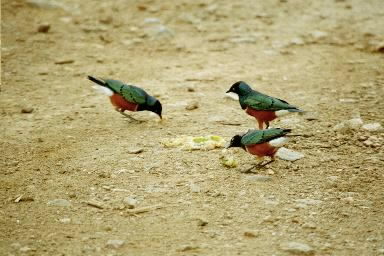 colorful starling
colorful starling
In truth, lions can't be bothered with most people. A person doesn't make a large enough meal, and most of the time when you find a lazy lion, it has just eaten. Certainly, if it decided to, it could eat a human in minutes, but it doesn't happen often.
We were off on a crack-of-dawn game drive, so breakfast was an inadequate few cookies and coffee. We went to hunt for the lions we hadn't heard around camp the night before.
It didn't take long.
"That lion is in a tree!" exclaimed the usually calm Wilfred.
There was an older male lion on a tree branch, shifting his weight uncomfortably. Below him was a herd of what looked like a hundred buffalo.
"They've got him trapped," said Wilfred. "The buffalo are taking their revenge. A lion is no match for that many buffalo."
How funny that we'd spent all of yesterday searching for tree-climbing lions and now we had stumbled across one in a park where lions just don't climb trees. He wasn't, in fact, a proper tree-climbing lion. He was just a normal lion in a desperate spot.
"Look, there's more!"
Two lionesses stood across the road, hidden in the large grass. They were clearly outnumbered and didn't know what to do.
"Which one do you identify with, the lion or the buffalo?" asked Carl from L.A.
I thought about it.
"The buffalo," I said. "I can't help but root for the underdog, and I'm not the king of the jungle."
"Now you understand that Osama bin Laden graphitti."
Indeed I did, and it was very troubling.
NEXT: leopards, cheetah, elephant, dik-diks, lion and more lion! Marie reminds herself that "it's the animals, stupid."